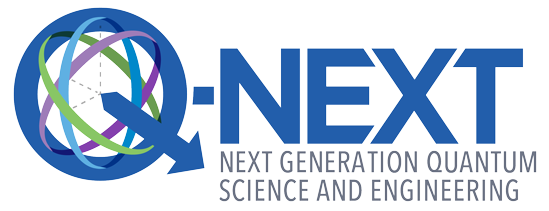In the News
-
4 mind-boggling technology advances in store for 2023
From Forbes: Q-NEXT Director David Awschalom talks about what we can expect from future quantum networks. Read More
-
Readout: National Quantum Initiative Centers Summit
From the White House: On Dec. 2, the White House Office of Science and Technology Policy hosted the thirteen National Quantum Initiative research centers to discuss the most pressing scientific and workforce challenges affecting quantum information science, as well as the impacts and benefits of the field for all of society. Read More
-
Quantum-ready workforce tops White House, scientists’ list of needs
From FedScoop: David Awschalom talks about the importance of building a quantum workforce and nurturing quantum startups. Read More
-
JPMorgan uses quantum computing to summarize documents
From Enter Quantum: JPMorgan Chase researchers have successfully demonstrated using quantum algorithms to summarize documents using natural language processing. Read More
-
Nadya Mason named a ‘Researcher to Know’
From the University of Illinois Urbana-Champaign: The experimental physicist, diversity advocate, and Beckman Institute director makes the Illinois Science & Technology Coalition’s list of Researchers to Know in 2022 for her “groundbreaking research driving innovation in the state.” Read More
-
Lloyd Rees Lecture and Geoffrey Frew Fellowship announced
The Australian Academy of Science has announced that Jelena Vuckovic of Stanford University has been awarded the 2023 Geoffrey Frew Fellowship, which is awarded to distinguished overseas scientists to participate in the Australian Spectroscopy Conferences and to visit scientific centers in Australia. Read More
-
PASQAL and University of Chicago announce neutral atoms quantum computing research collaboration agreement
University of Chicago's Hannes Bernien forms a new collaboration with PASQAL to advance neutral-atom quantum computing by developing new techniques for enabling high-fidelity qubit control. Read More
-
DoD Awards $59 million in University Research Equipment Awards
University of Chicago’s Hannes Bernien is among the recipients of the Defense University Research Instrumentation Program Award. The award supports his research in individual qubit control for atom array processors. Read More
-
The journey to building a true quantum computer
From Intel: Intel's James Clarke lays out Intel's path to building a full-stack commercial quantum system, including achievements and next steps. Read More
-
Introducing Crain's 40 Under 40 class of 2022
From Crain's Chicago Business: Pranav Gokhale, vice president of quantum software at ColdQuanta, makes Crain's Chicago Business's 40 Under 40 list, helpling build software that can be used to write quantum programs in any type of source language, which could speed up the development of quantum applications. Read More
News and features
See all news and features-
Design rules and synthesis of quantum memory candidates
From the University of Illinois Urbana-Champaign: Researchers use density functional theory calculations to identify possible europium compounds to serve as a new quantum memory platform. They also synthesize one of the predicted compounds, a brand new, air-stable material that is a strong candidate for use… Read More
-
‘Ruler for light’ could enable detailed measurement in personal devices
Frequency combs have revolutionized precision measurement, but the bulky, power-hungry devices are limited to lab settings. A new efficient laser “microcomb” developed by Stanford researchers could bring that revolution to the handheld electronics realm. Read More
-
Resurrecting niobium for quantum science
For years, niobium was considered an underperformer when it came to superconducting qubits. Now scientists supported by Q-NEXT have found a way to engineer a high-performing niobium-based qubit and so take advantage of niobium’s superior qualities. Read More
-
Researchers from startups, government labs and academia develop new techniques for making qubits out of erbium
Argonne project addresses quantum technology challenges and highlight sthe versatility of a rare-earth metal used in lasers and to color glass. Read More
-
Meet Edward Schmitt, facilities engineer
Former Marine Corps electronics technician Edward Schmitt keeps the Argonne Quantum Foundry running while advocating for veterans. Read More
